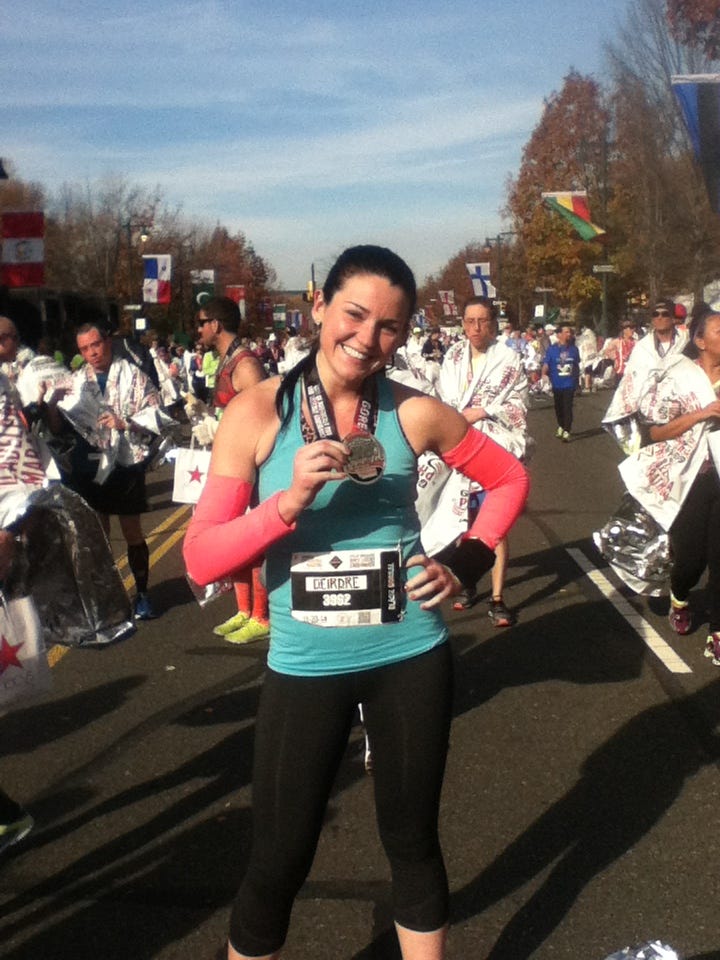
Courtesy of Deirdre Keane
- Deirdre Keane got to a marathon minutes before the gun, with only time to partially digest her breakfast.
- Within 5 minutes, she needed to relieve herself – and continued to do so at every stop for 16 miles.
- Keane got a personal best. "The sprinting from Porta Potty to Porta Potty strategy worked for me."
Deirdre Keane has completed 34 marathons, but tells other runners she's "a parody of things you shouldn't do."
For example, her pre-race diet may include Mexican food or Halloween candy, her race-day strategy is to run as fast as she can for as long as she can, and her ideal time to get to a race is a little late.
Experts recommend avoiding greasy, cheesy foods, pacing yourself, and giving yourself plenty of time on-site to warm up and use the bathroom before the gun goes off.
While Keane's laid-back approach has largely served her, it made the 2014 Philadelphia Marathon, well, uncomfortable. In part due to her hurried race-day breakfast, she says she wound up visiting every Porta Potty in the first 16 miles. And yet, she achieved a personal record.
"I think the sprinting from Porta Potty to Porta Potty strategy worked for me," Keane said.
Keane thought her start time was 30 minutes later than it was
Keane, a pediatric ICU nurse practitioner in New York City, traveled to the Philadelphia Marathon - her ninth or tenth - with a friend who was running the half-marathon. Keane assumed they had the same start time: 7:30.
But when the pair arrived at 6:50 and got in line for the Porta Potties, Keane learned her race was beginning at 7 - and she'd just shoveled two protein bars and two slices of buttered toast into her mouth with no time to digest or continue waiting in line.
She ran to the start and flung herself over the baricade - only to be surrounded by elite runners, with whom she aimed to keep pace.
But after just five minutes, Keane's stomach started "pumping," she said. "The reality that I may be about to poop myself set in."
Fortunately, that reality didn't come to pass. She saw an empty Porta Potty, used it quickly, and emerged "possibly five pounds lighter," she said.

Deirdre Keane
But it wasn't over. "My strategy became to sprint as fast as I could mile to mile to make it to the Porta Potty before the next explosion," she said. "I visited 9 portapotties in 16 miles that day. At mile 17, I was finally OK."
More than OK, Keane achieved a personal best time of about 3:38. "It took me two years to beat that that time," she said.
Experts recommend eating more than an hour before running
Tamara Duker Freuman, a New York City dietitian who works in a gastroenterology practice, told Insider that long-distance running could trigger the bowels simply because of the mechanics of the sport. "Your organs are jostling around," she said.
It can also lead to temporary incontinence since your blood is shuttled away from the digestive tract and toward your legs, she said.
What you consume before and during a race matters too. A high-fat dinner the night before can lead to more toilet time, and race-day gels with lactose or fructose can be harder for some people to digest.
Timing is also important: Stanford Health recommends waking up three to four hours ahead of your race, and eating mostly carbs with a little protein and fat more than an hour before start time. Runner's World suggests not eating within two hours of the race.
But sometimes the race-day runs just happen. In that case, runners recommend noting ahead of time where the portable toilets will be on the route and tucking some toilet paper or baby wipes in your pocket or fanny pack. Slowing down and drinking cool liquids can help settle an upset stomach too.
Or, like Keane, you can just go with the flow - both on marathon day and while training. "I'm a big believer that if running starts to take over your life or takes away value, then you need to reevaluate."
